China’s tough virus curbs mean that economic activity in the third quarter could be close to flat compared with the previous three months, while full-year growth may fall below 8 percent, a top forecaster said.
“My view is that the Chinese economy should slow sharply in the third quarter, mainly due to the virus but also controls on property,” Market Securities LLP chief economist Christophe Barraud said.
Barraud was Bloomberg’s top-ranked forecaster for the Chinese economy last year.

Photo: Bloomberg
Barraud’s prediction of 0.3 percent growth in the period between July and September from the previous three months is below the median estimate of 1.1 percent in a Bloomberg survey of economists.
Barraud is also bearish on China’s growth for this year compared to the market’s median estimate of 8.4 percent.
“It should be close to 8 percent, but with risks tilted to the downside,” he said. “If there is another outbreak in the fourth quarter, forecasts should be adjusted below 8 percent.” The government has set a target of above 6 percent growth for the year.
Barraud’s prediction came after monthly data showed China’s economy slowing sharply last month, with a slump in retail sales and property construction.
China introduced tougher curbs on travel to squash an imported outbreak of the Delta variant of SARS-CoV-2 from late July. While the measures quickly brought the virus under control, a new cluster has developed in southern China this month, suggesting some restrictions will remain and consumers will continue to be cautious.
“Risks are tilted to the downside because China will keep implementing a zero-tolerance policy concerning COVID-19, particularly ahead of the Winter Olympics in February,” Barraud said.
The France-based economist said that one of his favorite indicators of Chinese economic activity at the moment is the daily number of domestic flights.
“It’s the most reliable data to catch the impact of restrictive measures,” he said.
China is scheduled to release third-quarter gross domestic product data on Oct. 18. In the second quarter, GDP rose 7.9 percent from the same period last year, and 1.3 percent from the previous quarter.
Barraud said his forecasting technique involves trying to collect as much data as possible, including from private providers, before constructing a simple model with just five inputs for each predicted economic variable.
Those forecasts are adjusted based on experience and comparison with competitors, he said.
For the remainder of the year, infrastructure investment and fiscal spending are to be key variables indicating the extent to which Beijing is trying to support growth, he said.
The focus could be more on public investment “because everyone is waiting for public support,” he said.

South Korea’s equity benchmark yesterday crossed a new milestone just a month after surpassing the once-unthinkable 5,000 mark as surging global memory demand powers the country’s biggest chipmakers. The KOSPI advanced as much as 2.6 percent to a record 6,123, with Samsung Electronics Co and SK Hynix Inc each gaining more than 2 percent. With the benchmark now up 45 percent this year, South Korea’s stock market capitalization has also moved past France’s, following last month’s overtaking of Germany’s. Long overlooked by foreign funds, despite being undervalued, South Korean stocks have now emerged as clear winners in the global market. The so-called “artificial intelligence

Chinese artificial intelligence (AI) start-up DeepSeek’s (深度求索) latest AI model, set to be released as soon as next week, was trained on Nvidia Corp’s most advanced AI chip, the Blackwell, a senior official of US President Donald Trump’s administration said on Monday, in what could represent a violation of US export controls. The US believes DeepSeek will remove the technical indicators that might reveal its use of American AI chips, the official said, adding that the Blackwells are likely clustered at its data center in Inner Mongolia, an autonomous region of China. The person declined to say how the US government received

‘SEISMIC SHIFT’: The researcher forecast there would be about 1.1 billion mobile shipments this year, down from 1.26 billion the prior year and erasing years of gains The global smartphone market is expected to contract 12.9 percent this year due to the unprecedented memorychip shortage, marking “a crisis like no other,” researcher International Data Corp (IDC) said. The new forecast, a dramatic revision down from earlier estimates, gives the latest accounting of the ongoing memory crunch that is affecting every corner of the electronics industry. The demand for advanced memory to power artificial intelligence (AI) tasks has drained global supply until well into next year and jeopardizes the business model of many smartphone makers. IDC forecast about 1.1 billion mobile shipments this year, down from 1.26 billion the prior

FORTUNES REVERSED: The new 15 percent levies left countries with a 10 percent tariff worse off and stripped away the advantage of those with a 15 percent rate In a swift reversal of fortunes, countries that had been hardest hit by US President Donald Trump’s tariffs have emerged as the biggest winners from the US Supreme Court’s decision to strike down his emergency levies. China, India and Brazil are among those now seeing lower tariff rates for shipments to the US after the court ruled Trump’s use of the International Emergency Economic Powers Act to impose duties was illegal. While Trump subsequently announced plans for a 15 percent global rate, Bloomberg Economics said that would mean an average effective tariff rate of about 12 percent — the lowest since